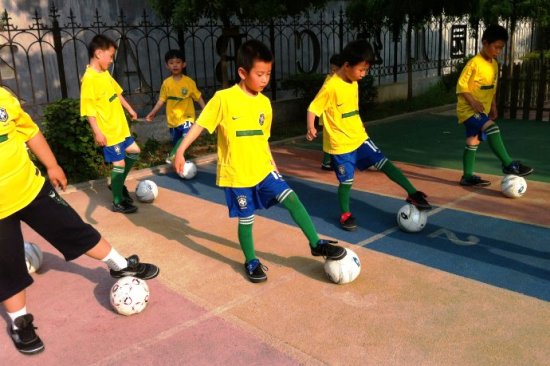 China’s new school curriculum emphasizing soccer skills reveals a massively ambitious plan to turn China into a international soccer powerhouse.
China’s new school curriculum emphasizing soccer skills reveals a massively ambitious plan to turn China into a international soccer powerhouse.
Guangzhou has now revealed how it plans to contribute to the national goal with a new three-year plan designed to cultivate soccer skills in youngsters.
READ: China Makes Football Mandatory In Schools As It Dreams of Championships
As with school systems throughout the rest of the country, Guangzhou will make soccer classes compulsory for all students in elementary and middle schools as introduce a four to six day soccer seminar as part of the school’s curriculum every semester.
By the end of this year, soccer programs are to be set up in 300 Guangzhou schools. By 2015, 25 specially-dedicated soccer schools are to be established throughout the city. By 2016, 500 Guangzhou schools should be involved in the program, creating a total of 5,000 intra-mural soccer teams from 500 schools and involving 50,000 students. Also by 2016, 75 specially-dedicated soccer schools are to be established.
READ: China Faces a Rocky Path to Football Superiority
The new focus on soccer and physical education is a radical departure from the standard practice of rote-learning in preparation for the gaokao, the university entrance qualifying exam.
Soccer development at a grassroots level is also a move away from the recent popularity of exclusive soccer schools with high tuition fees, such as the RMB 1.2 billion ($195 million) academy operated by Guangzhou Evergrande.
While President Xi has expressed his national dream for China’s youth to be healthy, a renewed emphasis on soccer may also reflect Xi’s desire for China to qualify, host, and win the World Cup, as seen here in cartoon form.
READ: Guangzhou to Build 100 New Football Pitches by 2016
Institutionalized soccer instruction is not new to China. In the 90s, around 4,000 traditional soccer schools were closed when Chinese football’s image tanked due to a failure to win Asian titles or qualify for the World Cup.
Aside from soccer, other international spots have seen great potential in China for sports development. Professional sports associations representing football, basketball and ice hockey have all expressed interest in developing their respective sports in China.
- Nanfang TV: Guangdong’s “Football Factory” an Attempt to Make China a Football Power
- The Nanfang Talks Evergrande and Chinese Football with Renowned Blooger
- Lionel Messi Says China Needed To Make Football Truly Global

